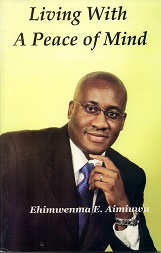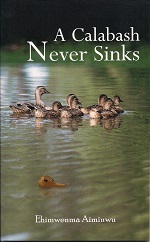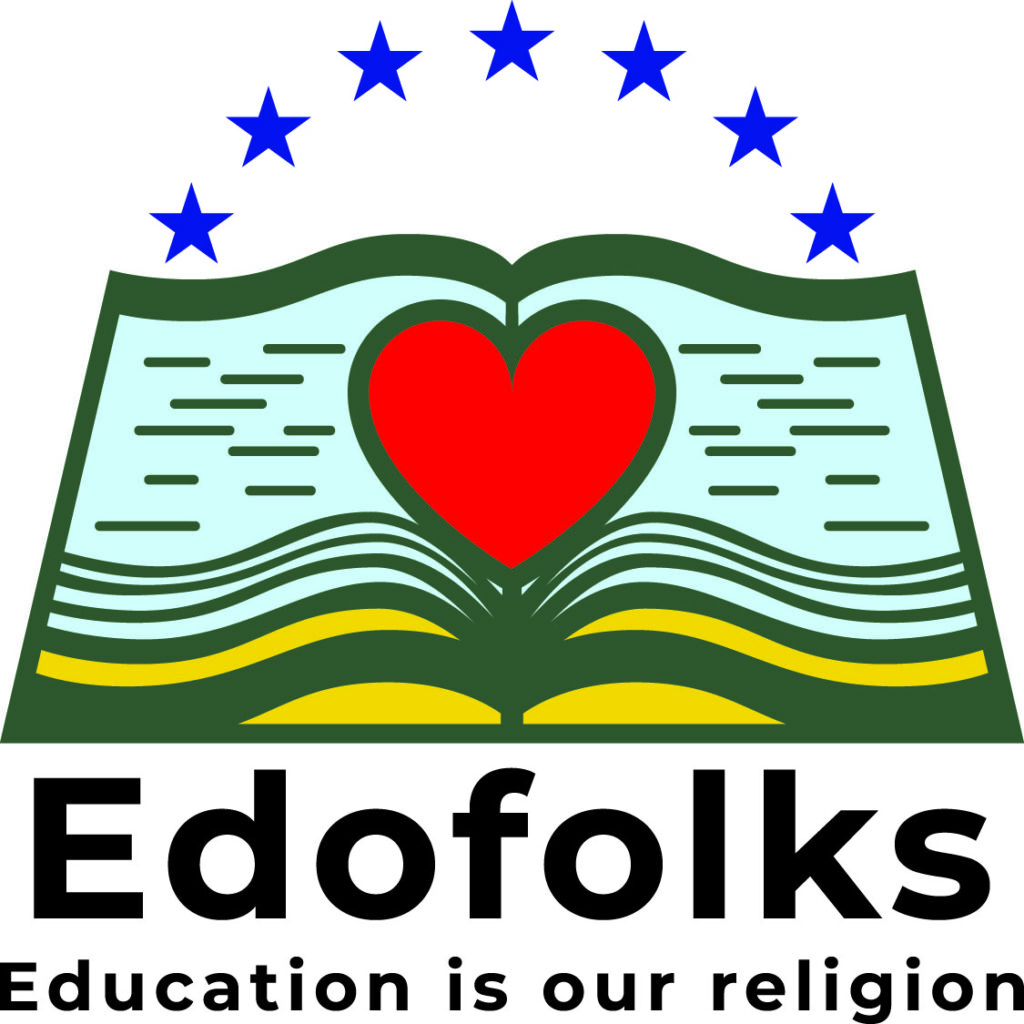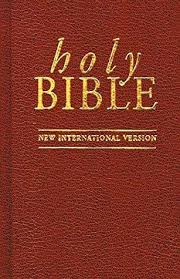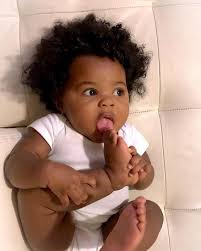I would second this idea of yours and help to enforce it anytime if given the authority to do so. Learning our history is certainly necessary. As you have rightly put it, it will afford everyone the opportunity to know and properly understand that we all have a common ancestry. However, learning or knowing our history should not obviate or preempt the introduction and use of a common language for all Edos now. How easy will it be to convince people that they share the ancestral origin when they are indignantly and vociferously denouncing the use of a common, unifying Edo language, which they know is the true road map and bridge to our historical past? What do we not already know about or in our history that is preventing us from doing the right and proper thing?
This has really been a very important discussion. I hope,
someday, all of us will come to the realization that one common
language for all Edos is very imperative for us to remain viable
and extant as a people within the geographical entity called
Nigeria.
This has really been a very important debate, and I thank our
sister Helen Wright for spurring the discussion. Sandra, thanks
for following it up. To all the great participants: Frank,
Nowa, Benjamin, Dan, Blessing, Okorho Iyi-Eweka, Tina, and all
of you whose names I cannot possibly remember at this moment, I
say good job. May the spirit of our ancestors be with you all.
I will not belong to Ndigbo, Oduduwa, or Arewa republic.
I am Edo – I will die Edo!
***************************************
I agree with your analysis. There are signs everywhere that Edo state is
politically, geographically and strategically isolated and, therefore, wide
open for balkanization and liquidation. In fact you put your finger on it
in one of your postings yesterday or the day before – lack of leadership and
foresight
What should we do? Find below some random ideas, some of which may be
controversial:
At primary and secondary levels, I personally favor a two dialect approach.
In other words it should be the long term goal of the State that everyone is
conversant in at least two dialects of the language. One should be Edo
(“Bini”) – because it is currently the most widely spoken and developed –
and the other, ANY of the 27 dialects/subdialects in the area. That allows
individuals the ability to switch to a central form of communication when
necessary while at the same time recognizing and allowing expression for our
rich dialectical heritage. Different LGAs, (or perhaps Villages) for
example, can opt for more local variants as their “second Edo dialect”.
Ofcourse some of the dialects/sub-dialects of Edo are less well developed –
in written form – than others but at least it allows even the smallest
dialect to feel that those who want to learn it can do so with equal
opportunity. What I intend by this policy is that no matter what your
specific heritage is, you must learn the dialect mix of the location you are
living in. Thus, for example, if one is living in Akoko-Edo one must become
conversant in at least one local Akoko dialect AS WELL AS Edo. The problem,
ofcourse would be to choose which one of several Akoko dialects to be the
“second Edo dialect”. In areas with such diversity one could recognize a
municipal level of administration below the local government.
Language teaching can be done in a simultaneous or sequential or combined
manner. Each approach has advantages and disadvantages, including the
problem of resources and teachers
1. Simultaneous Option: BOTH Edo and a local variant dialect are taught at
all levels through primary, junior secondary and senior secondary in the
region of interest.
2. Sequential Option: Teach the local variant at primary level and reserve
Edo for junior and senior secondary levels in the region of interest (this
is how Lugard enhanced Hausa in the North)
3. Simultaneous Sequential Option: Teach Edo PLUS the local variant at
primary level and then focus on Edo at JSS and SSS levels.
4. [The Awolowo option (meaning how he did things back in the West for
Yoruba): Teach Edo dialect in schools. Leave it up to homes and families
and social groups to teach other dialects.]
At degree level, I favor a program whereby there is a generic Bachelors
program in Edo with Masters /PhD degree programs in any of the 27 or so
variants. This allows us develop a linguistic pool of literate Edo teachers
and researchers with branches of our rich culture fully represented while
enabling the evolution of a core of competent Teachers who can go to local
levels to implement the ‘second dialect’ policy.
English Signposts and SignBoards in Edo State should be changed to the
language – with translation to English on the side. On Okada airlines (if
it still exists) and other forms of transportation in and out of the state
English and Edo should be used in communication. Tickets etc should be
printed bilingually.
Churches and mosques and shrines who are not already doing so should be
encouraged use local dialects in services as much as possible. If you ask
me, and I know this may sound controversial, we should develop an
interdenominational Church of Edo. Our externally imposed religious
diversity is a problem. Edo days and festivals should be given official
status. By this I do not merely mean Igue or the more well known festivals
inside Benin City. I mean local festivals across the length and breath of
the State. Such festivals afford an opportunity to reinforce the culture to
our young ones. Which level of government should recognize which festival
should be negotiated.
Traditional Sports festivals should be held. I do not mean soccer or
basketball. I mean that ALL forms of traditional Edo games in ALL of our
villages should be collated and codified and taught THROUGHOUT the state so
that we can have a yearly traditional sports festival at which medals can be
given. Some of such games have incredible ability to develop character and
thinking skills
Just as we have National Spelling Bee in the US we should have one for words
and proverbs in Edo State. We should also have technical “inventor”
competitions. If we take the trouble to create a museum of Edo Engineering
many would be surprised at the ingenuity of our ancestors
We should develop a state recognized Edo national award system [different
from chieftaincy] to recognize deserving Edoites in various fields of
endeavor no matter where they are in the world. Example, “Grand Commander
of the Order of Edo” or “Defender of Edo” etc….. Certainly chieftaincy
should be retained but this award system allows the integration of a wider
segment of modern Edos into the value structure
These are just a few ideas – some of which I have mulled over for several
years but haven’t fleshed out in detail. One area that has caught my
attention is the design of our educational system. How do we bring back the
old system of parental and family story telling as a method of education?
As the saying goes anytime an old man dies in Africa it is like burning a
library. I have learnt a lot by talking to my father in the few months he
stayed with me here. I make it a point of duty to talk with him everyday for
30 minutes about the family and our heritage. It is curious that through
all the years of my upbringing the life cycle of schooling and boarding
school and leaving home for school etc prevented the father-son story
telling tradition. I have since found, now that I am 42, that this was a
dangerous omission from my upbringing. I wonder how many others out there
have the same problem.
Another area is the related question of guilds. It has been a source of
concern to me that in the last 50-75 years our families have become
segmented professionally in a “begin again syndrome”. What do I mean?
Nowa’s father was a surveyor. Nowa’s grandfather was a farmer. Nowa is a
doctor. Nowa’s son became a lawyer. Nowa’s son’s son became an accountant.
etc…. Every generation is restarting and not being handed the baton of
“old money” and contacts and markets. This is dangerous for the tribe in
the long term. I have closely studied white people and seen many patterns
of family and group consolidation over generations. We used to have it in
our guilds. We seem to have lost it.
**********************************************
Thanks for providing the Nigerian languages historical perspective below.
The information in your contribution below, is quite useful. It provides a
clearer understanding of where we are and why we are here in the EDO
Language matter.
By the way, the “singularization of tongues” does not implies exclusively
that a new language must be carved out of the existing dialects of the EDO
people. It simply begs for a language (existing or new), to be adopted and
actively taught to the majority of our people…especially the younger
generation. Any of the EDO languages that currently exists, will serve well
as a bridging unifying tongue for all EDOS. Each of the languages, such as
BINI, ESAN and the others already possess much in common with each other.
The variances that exists among them, is not in line with the variances that
exists between Greek and BINI languages for example. The point is that an
EDO language needs to be officially adopted and taught across the state as
the EDO main language.
I cannot imagine how and why a teacher or a Principal can refuse to
implement a directive given by the governing body to teach BINI in the
classroom and nothing happens to the teacher/principal for that horrible
insubordination. It is expected that there will be pockets of resistances to
such directive, even if the overwhelming advantages were made clear to those
persons. However, the effort has to continue. This is where a firm and
dedicated leadership comes into it.
Nowa, I am concerned that in a world that is continually and perhaps,
RAPIDLY, moving towards unbounded INDIVIDUALISM at all levels, there may be
little room for a people and their culture if they fail to institutionalize
the basic factors that unify and keep them together and strong. There is
also the element of rouge neighboring states, whoes desires include
absorbing and over-running those areas where the people do not care if they
are EDOS or anything else. As strong as the IGBO language currently is and
coupled with their aggressive efforts at acquiring all that is in their
sight, is it not possible that the Igbo language can become the dominant
language spoken in EDO land some 50 or more years from now? How about the
Yoruba? What about an Arabic language sponsored by the Islamic faith that is
steadfastly and in a blanketing format, absorbing all of Nigeria? Without a
strong EDO language that is generally used across the state, ! ;EDO runs the
risk of being submerged and dwindled severely in the distant future.
Now, what do you think we should really do? What direction must EDO work
towards along the line of commonizing/singularizing our tongues? What are
some strategies and programs that can be stepwisely deployed to move us in
the direction of adopting a language for all EDOS and that can guarantee the
desired result for good?
I await your expected response and thanks
*********************************************************
I wish I was present during those discussions with the honorable Chief to
clarify what he meant. The way other ethnic groups in Nigeria chose
“central” or ‘standard’ dialects (or had such chosen for them) was as
follows:
Hausa – ‘Arewa’ dialect was chosen by Lugard based on ease of
intelligibility to colonial officers and the fact that like Shua Arabic, it
already had a written form. The matter was settled. The British later
officially recognized it. That is what is spoken on the BBC Hausa service.
Hausa people did not meet to vote on the matter.
Igbo – Owerri dialect (with some Onitsha) was chosen by the Missionaries as
the written and therefore formal Igbo. Between the Catholic and Protestant
(Methodist) faiths there was a struggle. There was a rival attempt to
merge five different Igbo dialects. It failed because the grammar and
tonation just would not work. The Ibo State Union later backed the Owerri
dialect – with minor Onitsha enhancements. That is what is standard Igbo
today.
Yoruba – This was enabled by the use of the Oyo dialect for the translation
of the Bible by Ajayi Crowder. Through the process of christianization the
Oyo dialect became the dialect of the Yoruba elite. Minor enhancements were
made later on with “Lagos” versions etc… But the Oyo dialect is basically
what is known as ‘Yoruba’ today. Even though Awolowo was Ijebu he stuck
with the Oyo variant.
Tiv (formerly Munchi) – no debate because Tiv has only one dialect
Efik – central Efik chosen over variant Annang. More widely spoken. The
British later officially recognized it.
Ibibio – not much debate either. Ibibio dialect
Urhobo – Agbarho dialect chosen (by who?) over several others. Supported
by Mowoe et al. The British officially recognized it. Agbarho is still
the formal written and taught Urhobo today – including the recently launched
dictionary
Kanuri – Kanuri dialect chosen over several variants. Most widely spoken.
The British later officially recognized it.
Fulani – fulfulde
Edo – The Bini dialect began being developed as the written form of Edo as
far back as 1910. It was the most widely spoken variant of Edo among the so
called “northern Edo” (later Benin province). Parts of the Bible were
translated into Edo around 1915. In the thirties and forties Edo books
started to appear. The British officially recognized it – and actually
translated the Nigerian Constitution into Edo (as well as eight other
‘major’ Nigerian languages) in the late forties/early fifties. That is how
Edo became one of the nine major languages Radio Nigeria used to use for
broadcasts. I would have expected Chief Enahoro (as an Edo man and
prominent politician who, by the way, is married outside of his own clan )
to provide political muscle to sustain the momentum for the adoption of
standard Edo. I cant quite understand why there became a need to re-invent
the wheel and create a new dialect to replace the one that was already a
‘major National Language’.
The concept of “unification of tongues” as Chief Enahoro says he was
proposing was already tried by Igbos in the 1930s and early forties and
failed. His mentor Awolowo (although an Ijebu) did not try it in the West.
No other ethnic group in Nigeria that has multiple dialects has been able to
create a ‘bridging singularized tongue ‘ composed of ALL the component
dialects if that is what the Chief has in mind. Those that have worked have
focused on one dialect – for whatever reason – and developed it. In areas
of linguistics where the chosen dialect is lacking, supplementation by word
transfer from others is an option. So it is not very accurate to say that
an ethnic group that cannot combine dialects across the board is doomed to
fail. Truth is that no ethnic group in Nigeria has done so without using
ONE dialect as the pillar. In the case of Edo much more progress would have
been made if the last 50 years was spent on optimizing the weaknesses of Edo
with other Edo dialects, rather than trying hard NOT to learn or speak
‘Bini’` for God knows what reason – as Hilary pointed out. Speaking one
dialect does not preclude speaking others.
Indeed Edo was formally taught across Benin division and most parts of the
province in schools and later became a formal degree/certificate program at
Unilag. The primary reason why Edo has not flourished is, therefore, not
for want of a dialect that is spoken by a large enough segment of the
population and has historically been regarded as the ‘Edo’ language in
Nigeria – with no more or less authenticity than Yoruba, Igbo, Hausa, Efik
etc….. Even inside Benin City there have been complaints of some teachers
refusing to teach Edo for reasons that are baffling – not to mention parents
(including so called Binis) who do not want their children to learn the
language fearful that it might affect their English. At FGGC Benin I am
told that inspite of a federal policy that the local language be taught – ie
Edo – successive Principals came and went refusing to implement it. The
same teachers would later return to their states and proceed to implement
the policy with their own languages.
[Among the Urhobos such tensions have reared their heads recently with some
speakers of the Okpe dialect sought to challenge the long established
Agbarho dialect. But recognizing the can of worms that would result, most
Urhobo intellectuals have stuck with the unifying Agharho dialect – even
though many are not from the Agbarho clan. That is a lesson for the Edos]
I plan to take this up with Chief Enahoro if I get the opportunity to meet
him.
********************************************************
How U dae? Great to read from you.
Not too distant in the past, we had the opportunity of having the Chief,
Anthony Enahoro spend several days with us in Dallas…multiple times.
During some of those visits, he would stay up deep into the nights and tell
us about the old days and the days of HOPEFUL politics for Nigeria and EDO
people. My brothers ViK and Steve can verify the above any day.
In those conversations, we learnt of his efforts since the past 3, 4 or so
decades to get the EDO peoples’ leaders to work toward a bridging
singularized tongue for all EDOS. The indefatigible chief lamented that all
his efforts to move EDO forwards along the lines of the Yorubas, Igbos and
Hausas had no support among our leaders. The fact remains that he initiated
the idea of an EDO unification of Tongues amongst EDOS before the Igbos
began their effort as well as the Hausas. But here we are, many decades
later, still wondering about what to do and how to get us organized to
deploy a unitary language thread to bridge all EDos and wrap us into one
family that think and work together as a single team; but living and
breathing together as a fully integrated whole.
The chief elder stateman warned that until EDO is able to do so, we will
continue to be decomposed and ununified in our ways and thinking even when
faced with the clear reality that a joint performance and teaming is in our
devine interest. Well, the LEGACY of this singular failing by EDO people has
impacted us in one form or the other and repeatedly. We lost the Urhobos,
Itsekiris and much of the Ika Ibos to a so called Delta state largely for
the failure to commonize/unify our tongues in the distant past. The lack of
cooperations and even adversarial fights between EDO Senators at the
national Senate level, is a direct spin-off of the old EDO language
diversity of “do your own and let me do my own” syndrome(sp).
If the current state remains, we risk becoming sectionally modularized
without linkages amongst/between us. Worse yet, we risk becoming further
decomposed and compactmentalized for other’s/the vultures’ picking. It is no
doubt that we need NOW, to worry about the future of the EDO people and
their culture and ways of lives. In one hundred years time, will there still
be an EDO people and culture at this rate of “crumbs set in the wind”,
dispatching? Do we want the story to be: “There use to be a powerful people
and kingdom somewhere over there, but no one knows what became of them”?
Should we not unify to save our people and culture now that we can do
something about it and before it becomes too expensive and too late?
I am concern and so should you if you are a proud EDOID.
Enjoy the weekend…BENJAMIN IMHONDE.
**********************************************************
Our hourable elder statesman Chief Anthony Enahoro has long advocated the
adoption and development of one standard Edo language to be taught and used
by our our people. I recall that he spoke on this subject at the Edo
Convention in Atlanta in 1996. Although I did not attend the convention, I
recieved a copy of his keynote speech on the occassion. Why has any of our
leaders/educators and linguists not bothered to explore this idea? Since
other tribes have done this before the Edo people, we know that it can be
done. Would this not have been a good opportunity for our natural rulers to
work with the elder statesman while his yet living among us? It may be that
we are bogged with so much other problems, we tend to neglect the areas of
opportunity……Or is it a case of “uma i gba n’edo?”
Peace…..bea. – Nigerian languages
*******
Thanks for explaining part of the problems concerning the Edo
language. I know we have discussed this in the past on this forum. For
those who have forgotten, please note the following:
1- The inabiility of the Edo-speaking people to adopt one dialect-BINI as
the basis for Edo language speakers should be laid at the feet of British
administrators after Benin fell in 1897. When they recognized the
Urhobo-Agbaroh dialect, they embarked on what I described as the “language
balkinazation of the Edo speaking world.” This was preceeded by political
balkanisation when the authority of the Oba of Benin was restricted to the
BINI-SPEAKING AREAS of the old Benin Empire. The rumblings from the Edo
State Traditional Council is a left over of the effect of those British
decisions. Did the British residents not know that Urhobo-Agbaroh or Okpe
dialects as part of the Edo/Bini language? May be not. Did they know that
Esan and Afemai are just dialects of the same language ? Probably not. The
damage has been done.
2-The first group of Yoruba educated missionaries who came to Benin City
after it fell, did much to discourage the development of Edo language.
They convenietly forgot that the Yoruba language of Rev Ajayi Crowther and
Samuel Johnson, was 90% Oyo dialect forced on the entire ANAGO SPEAKING
WORLD, called Yoruba today. They used the language to unify the Yoruba
groups in a pan-yoruba political movement, while they used it to divide
the Edo-speaking world. Everybody was afraid of Oba Ovonramwen or his
successor, Oba Eweka II. They wanted them humiliated.
3-With very clan in the Edo speaking world claiming ascendancy over the
others, it has become difficult to have one EDO language, like the yoruba or
Ibos. We now have the Bini, Urhobo, Isoko, Esan and Afemai Holy Bibles. The
Yorubas and the Ibos have one each. Which of the clan is ready to give up
her claim? Dr. Okojie of Irrua might tell you that Esan is not even a
dialect but a language of its own-probably different from BINI. This is
where we are
today. Governor Samuel Ogbemudia had an opportunity to do it but the
objections from many quarters nip it in the bud. Just as every village has
an Oba nowadays , we are starting to have different Edo reading books
representing those villages.
4-The Ogieraikhi’s controversy at UNILAG did not help us. Outsiders through
stones into it. They knew he was in a hurry to modernised Edo language. He
wanted do in five years what it took the Yorubas to do in 100 years.
So the program crash landed.

